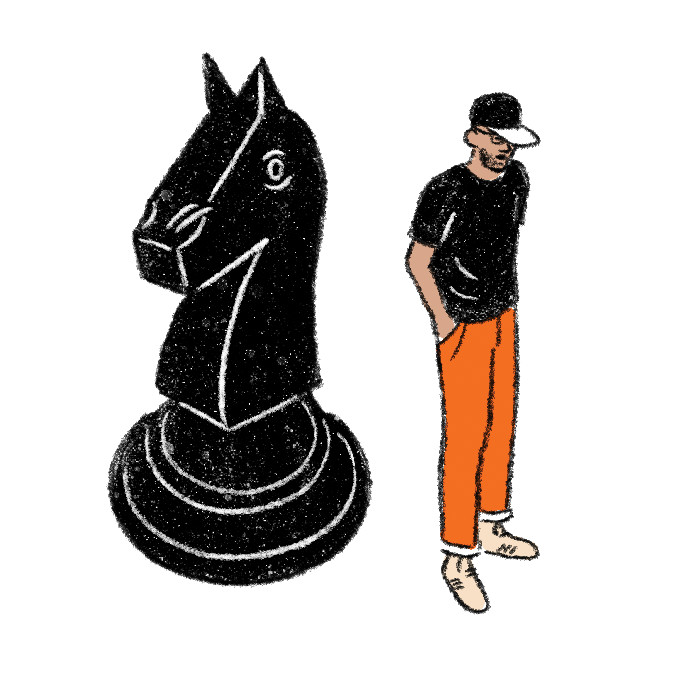If you would like to score an easy victory in chess against someone who is unfamiliar with the game, and you are playing as white (a similar idea can be employed if you are playing as black, but it is, as in life away from the chessboard, more difficult), then you can make a simple sequence of four moves: pawn to e4, queen to h5, bishop to c4, queen to f 7. So long as your opponent responds with a cooperating move, and doesn’t bring their knights to the c6 or f6 squares or their queen to e7 (not as good a move, but it will do the trick), you will get a checkmate within four to seven moves. This is because at the start of the game, black’s pawn on f 7 is the weakest of the bunch (along with the corresponding pawn on f 2 for white), its only defender being the king, the board’s most vulnerable piece, the key to winning. Coordinate an attack on the f 7 pawn out the gate, win fast.
I was burned by this enough times when I first started my online chess hobby that I decided I should look it up and be prepared the next time it came my way. It’s called “the scholar’s mate,” so named by Francis Beale in The Royall Game of Chesse-Play, published in London in 1656, an adaptation of the work of Gioachino Greco, an Italian player considered the strongest of his time. Modern use of the word scholar—a person who has studied their subject matter to the level of mastery—would suggest this is an advanced tactic. But usage of the seventeenthcentury term (spelled scholler) is in line with the other definition (which is still in use at times): a student. The other names the move goes by give the game away: in Russian, Ukrainian, Latvian, and Lithuanian, it’s “the children’s mate”; in Norwegian, Serbian, Danish, and Swedish, it’s “the school mate”; in Czech, German, Hebrew, and Polish, it’s “the shoemaker’s mate”; in Italian, it’s “the barber’s mate”; in French, Portuguese, Turkish, and Spanish, it’s “the shepherd’s mate.”
When you sign up for an account on Chess.com, you are given a rating, which is calculated by a scoring system based on the one used by the US Chess Federation (called Elo). Both systems award points for wins and deduct them for losses, and attempt to approximate a player’s relative strength. (I’m hovering around 900; for context, a grand master is someone who has achieved a 2600; Magnus Carlsen, considered by some to be the greatest chess player ever, has an Elo rating, in classical chess, of 2832, and has been rated as high as 2882.) After you request a game, you’re matched with someone with close to your own rating; this way, you’re playing opponents with comparable skill and experience levels. At the lower levels, where beginners like myself play, you come across scholar’s mate attempts often, with novice chess players seduced by the lure of quick wins and easy points. They play as if they were the first to unlock this chess hack, when really it’s a cheap trick almost as old as the game itself.
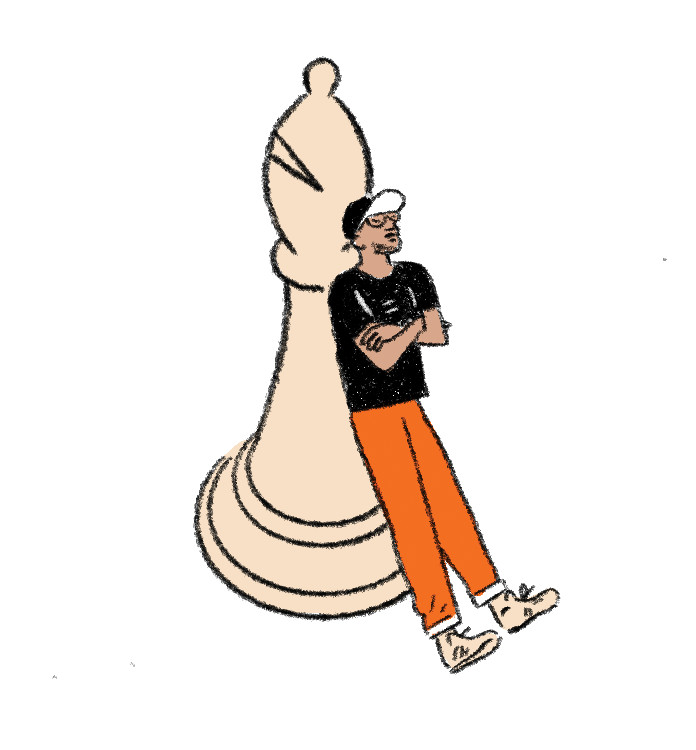
The chess grand master at the center of Stefan Zweig’s novella Chess Story has the background and personal characteristics of someone whom a serious chess player might presume would rely on the scholar’s mate. Mirko Czentovic, son of a “penniless Yugoslavian Danube bargeman,” is described as semiliterate, “unable to write a correctly spelled sentence in any language… The letters of the alphabet had been explained to the boy a hundred times, yet still he stared at them as though he had never seen them before.” At age twelve, after his father’s death in a boating collision, he is taken in by a local parson who is irritated by his apathy: “He did nothing unless specifically told to, never asked a question, did not play with other boys…”
Despite his lack of intellectual curiosity, the young Czentovic observes the parson’s nightly chess games, and once given the chance to play, displays a surprising talent. After repeatedly beating the parson, he takes on competition at the local chess club, where, after an initial stumble (he hadn’t seen the Sicilian Defense at that point), he comes to dominate the competition. He still possesses intellectual roadblocks—he is unable, like many grand masters, to recall the board from memory—and his “behaviors and manners remained those of the simple country boy,” but by age eighteen he wins the Hungarian Championship, and at twenty he becomes the world champion, defeating grand masters who are “infinitely superior to him in intellectual gifts, imagination, and daring.” He draws comparison to the great grand masters of the time—Emanuel Lasker, José Raúl Capablanca, and Alexander Alekhine (who was the actual chess world champion at the time Chess Story was published).
That the success of someone like Czentovic in the world of chess would come as a shock, even for a fictional character, has to do with the idea that chess is a game that only those in professionalized intellectual classes can succeed at. When Oppenheimer became a blockbuster sensation in the summer of 2023, the online chess community buzzed with the rediscovery of a chess match once played between Robert Oppenheimer and Albert Einstein, the kind of big brains typically associated with the game. Except this match possibly never took place—Einstein wasn’t much of a chess player, and claimed he’d played only a few times as a child; he wrote in the foreword to a biography of his friend Lasker: “I am no chess player myself, so I am not in a position to admire [Lasker’s] mental powers in the sphere of his greatest intellectual achievements; indeed I have to confess that I have always disliked the fierce competitive spirit embodied in that highly intellectual game.” But the rumor that it did take place holds sway because of our cultural understanding that chess is the favored pastime of those who pursue the life of the mind.
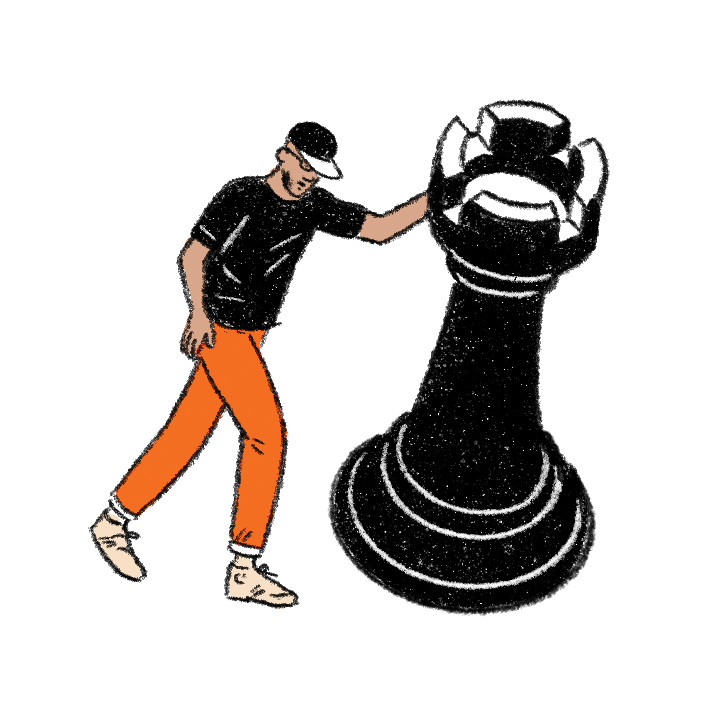
But chess is not for the intellectual, as in, reserved only for those who exhibit “natural” intelligence or take on vocations within the world of knowledge production; rather, chess pushes the intellect of any person who sits down to learn its rules and study its vast possibilities. But a society convinced of the former idea unevenly distributes praise for mastering the game. Zweig’s Czentovic may be fictional, but the men who occupy city parks with their chess sets, hustling the game either as a leisure activity or for much-needed cash, are flesh and blood, and there is no mad societal rush to crown their talent as genius, no searching for the next Stanley Kubrick among them. (In the 1940s, Kubrick supplemented his income as a photographer by hustling chess in Washington Square Park in New York City; the game is a notable part of his film 2001: A Space Odyssey.)
These chess players, a significant number of them black men, in my experience, will never receive formal recognition from FIDE, the International Chess Federation, but continue to exist as versions of the titular “little man at Chehaw Station” in Ralph Ellison’s 1978 essay: at the end of the essay, a young Ellison is confounded by his discovery of a room full of coal heavers who are passionately arguing about opera. They are as knowledgeable as they are, Ellison learns, because they also work as extras in productions staged by the Metropolitan Opera. The anecdote bolsters Ellison’s assertion throughout the essay that, in the US, culture filters out into unexpected places, and the unexpected people in those places are capable of offering perspectives that require serious consideration. “Many of us,” he writes, “by the way, read our first Hemingway, Fitzgerald, Mann in barbershops.”
I didn’t inherit chess. My father’s game—though I never saw him play and he never instructed me on how to play, either—was backgammon; I’m guessing he had an affinity for it, because he owned a leather-bound backgammon set. The game I saw him derive the most pleasure from was Monopoly, and I watched him gleefully bankrupting my brother and me as he lived out his capitalist fantasies. My mother was a reluctant game player, coaxed into them only on special occasions.
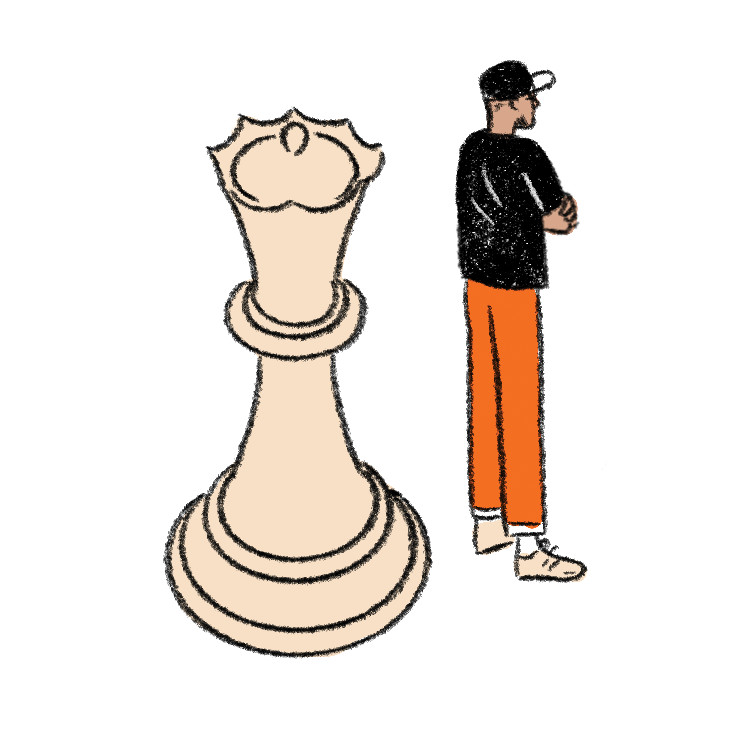
I learned chess during summer camp at a Boys & Girls Club in Norfolk, Virginia, between my seventh- and eighth-grade years. When I say I “learned chess,” I mean I learned how the pieces move, and that the idea is to checkmate the king—no theory, no tactics, no strategy. It might have been that that was all the counselor who introduced me to the game had time to offer, or perhaps it was all he knew. It seems, in hindsight, that the reason he took me, in particular, aside to teach chess to was because he identified me as bookish, lacking the physical gifts of my summer camp peers, who never wanted me on their basketball team (fair enough, but they underestimated my jump shot and youthful ability to be a pest on defense), and he wanted me to have something on which to hang my self-esteem.
I never excelled at it; I beat the kids at summer camp, but they never played out of interest, only boredom, and they would get stuck on their confusion about the knight’s mysterious L-shaped limitations. Beyond that summer, I didn’t play much. I did get a chess set—the memory of it comes back to me only while writing this—but it went unappreciated. I played against myself a few times, but never with the obsessive devotion of a young Bobby Fischer, and I rarely came across anyone else who knew how or wanted to play.
After the advent of smartphones, I would download a chess app every other year, play a few games in which I would lose in spectacular fashion, whether against human or computer competition, then neglect it out of frustration. The last time I played over the board was at a friend’s house in the pre-pandemic days, a game that started around midnight and went on for close to two hours, in which I irritated my opponent by refusing to resign, even after they had taken every one of my pieces except the king. I bounced the king around to whatever square it could go to, neither of us aware that a game could end in a draw.
But since the end of December 2023, I’ve played every day. I do chess puzzles. I watch YouTube videos that promise to improve my game. I even bought one of Capablanca’s books, Chess Fundamentals, though I find it hard to follow, since he notates moves that aren’t diagrammed, and it’s a strain to keep track of where everything is without a picture. (I’m like Czentovic in this way, unable to visualize the board without it being right in front of me.) I don’t have any delusions about becoming a chess master, but I am trying to become good.
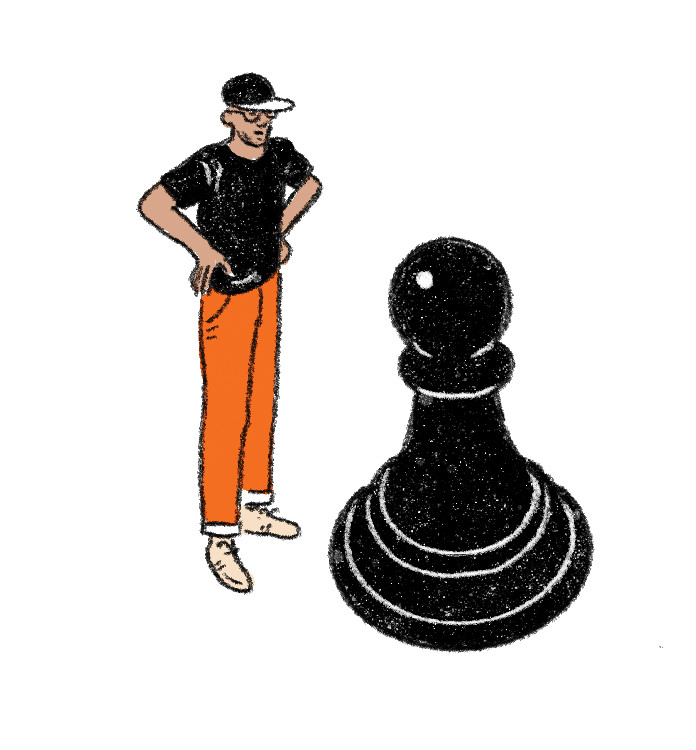
Because good chess requires an active mind—the simultaneous need to defend and attack, suss out a good sacrifice versus a poor one, maintain awareness of your opponent’s intentions, deciding when to push your kingside pawns, remember the threat of a distant bishop—it demands high-level thinking. After a year of big feelings, I needed a way back to thinking. On February 4, 2023, my daughter was born; then on October 1, my mother died from leukemia. It has taken the exact emotional toll it sounds like it would. Everything that grief brings to the table—anger, sadness, fear, guilt, despair—is cranked up a little higher when I look at my daughter and think of all that she will miss out on, all that my mother will not be around to see. There are the firsts we all celebrate—steps, words, birthday—but there are things you don’t consider until you have to: my mother won’t be around to witness her grandchild biting into her first chocolate chip cookie; my daughter will never taste her grandmother’s chocolate chip cookies (they were the first thing she taught me to bake). My mother won’t teach her granddaughter the finer points of chair dancing to Luther Vandross. (I went with my mother the only time she was able to see her favorite singer in concert.) My daughter will never get a kick out of hearing my mother call me solely by my middle name, knowing it means I’m in some kind of trouble (who knows how many times in my life this happened). And on, and on, and on. The picture of the future I held on to, the one that buoyed my mother’s spirit through the chemo, and the physical therapy, and the infections, and the hospital stays, has been shattered. It’s a grand absurdity of life that after your mother dies, life has the audacity to go on.
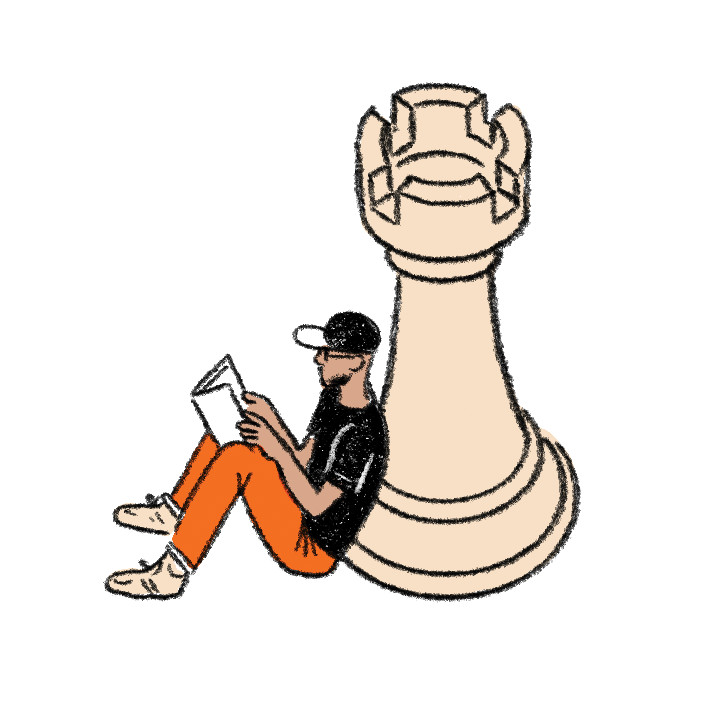
And so I cry. And my partner consoles me; my brother consoles me; my aunt, my mother’s twin sister, consoles me. I feel my big feelings. But I need to be able to think. I realize it sounds like I’m drawing too clear a line between thinking and feeling, as though they are fully separate in function and experience, but here I mean the critical thinking my work as a writer and teacher requires of me. Awash in big feelings, I didn’t have access to that part of myself. And no one expected me to; after your mother dies, everyone offers you grace. But life keeps happening, the classes need teaching, the book needs writing, and grace will not suffice. I needed to rescue my thinking self, not only for my work, but also to remember there was something to life outside of the pangs of grief.
“I met Death today,” Antonius Block says in The Seventh Seal. “We are playing chess.”
Now I start my days with my three c’s: coffee, cigar, and chess (and sometimes end them with cognac in place of coffee). I can’t deny my attraction to the aesthetics of this image: a writer and his vices beginning his day with a rigorous intellectual exercise—not far off, if I’m honest, from the joy my father took in believing his children saw him as a master businessman in the imaginary world of Monopoly (in reality, I saw him taking joy in stealing our joy). But this ritual does exactly what I want it to do, which is to stimulate the part of my brain left dormant after my mother’s death, and in a low-stakes way. Winning or losing is irrelevant (I like to win, but I’m realistic); I need only for my mind to be activated. “But man is a frivolous and unseemly being, and perhaps, similar to a chess player,” the narrator of Dostoyevsky’s Notes from Underground says, “likes only the process of achieving the goal, but not the goal itself.” The process is exciting because there are as many ways to play chess as there are chess players: each new opponent offers a different set of challenges to solve. You don’t know if you’re going to an Italian Game (pawn to e4, knight to f3, bishop to c4, my favorite opening), a Queen’s Gambit, a King’s Indian, a Scotch (my least favorite to play against), an Alekhine’s Defense, a Ruy Lopez, a Scandinavian, and on and on. Does your opponent like to trade queens early? Are they a pawn stormer? Do they value bishops more than knights, or vice versa? Do you want to castle kingside or queenside? Do you castle at all? It’s all unknowable until the next piece moves, and then it all changes, and you have to carefully think your way through.
Which is why the scholar’s mate bothers me as much as it does. It’s an elitist idea to associate the scholar’s mate with shoemakers, shepherds, and barbers, as though by virtue of their professions they are simpletons who couldn’t possibly grasp the complexities of the game (and as though these professions don’t require constant critical thinking), but the scholar’s mate is an insult to those complexities. Even after the scholar’s mate has been refuted, those who don’t immediately resign the game, after their sole trick did not work in their favor, may start bouncing their queen around, under the illusion that the queen is indestructible, not understanding that it can be trapped and captured, or otherwise left unusable, given some resourceful moves on their opponent’s part. Chess isn’t simple, and it isn’t meant to be, but the scholar’s mate, along with the subsequent wayward queen attacks, seems to suggest there is a means of winning that bypasses all critical thinking in favor of memorizing a cheap trick, or using the board’s most powerful piece to bludgeon your opponent into submission. It deadens the game’s potential.
There’s a reason why chess endures as a metaphor for complex life scenarios. It’s ubiquitous to the point that a cast member on the reality show Vanderpump Rules compared a sit-down chat with a fellow cast member to a game of chess: they were discussing the aftermath of a very public cheating scandal. “I’m playing chess, not checkers,” most people have undoubtedly heard at some point, even if only from Denzel Washington’s corrupt police officer character in Training Day. It’s an especially popular adage among people who rise to the top of competitive fields, the implication being that they got there because they are able to outthink their competition in ways beyond their competitors’ abilities to comprehend. A Louis Vuitton ad from 2022 features Lionel Messi and Cristiano Ronaldo, the two greatest soccer players of their generation, sitting across from each other at a chessboard, sketching the metaphor without subtlety. (The position of the pieces on the board in front of them is not accidental: it’s an exact position taken from a game between Magnus Carlsen and Hikaru Nakamura, whose rivalry in the world of chess reaches the height of that between Messi and Ronaldo.) An article in GQ notes the game’s growing popularity among NBA players, who see parallels between chess and their profession. (How often has a commentator compared LeBron James’s virtuosity to that of a queen on the chessboard—able to do anything he wants, bending space at will, forcing his opponents to account for his tremendous power?) There is strategy for defense, spotting and exploiting an opponent’s weakness, summoning creativity in the face of the unexpected, and above all finding harmony, learning how each piece can support the others.
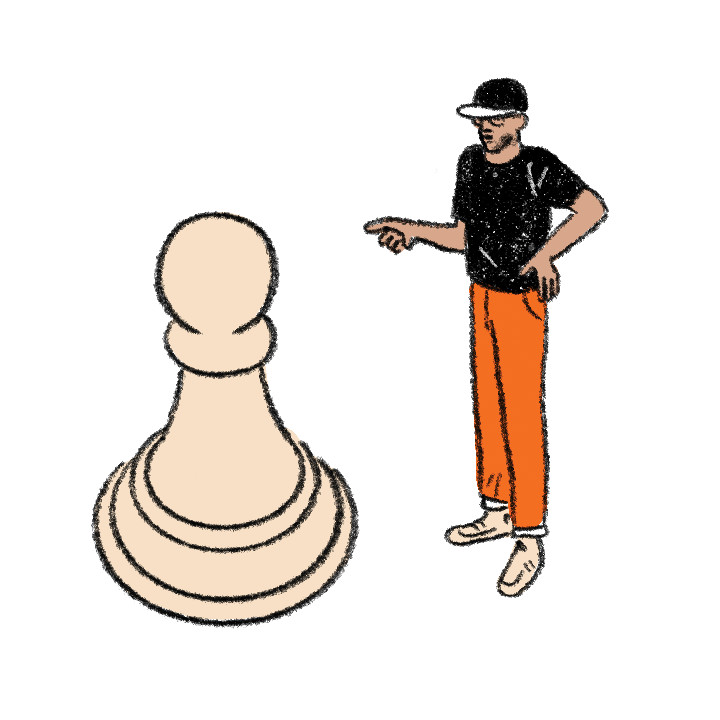
A YouTube channel I follow posts classic games, and one in particular—between Capablanca, a Cuban chess prodigy and the world champion from 1921 to 1927, and Oldřich Duras, a Czech chess master, in 1913—stands out as a benchmark of this concept. Capablanca, playing as black, reaches an endgame where he is up one pawn, but each player still has one rook, the board’s second most powerful piece, and those pawns can be snatched without careful attention. But Capablanca forms a chain of his three pawns, king, and rook, then walks them down, each supporting the others, each issuing its own threat, until Duras resigns.
It’s in moments like these that the beauty of chess reveals itself, and when the description offered by the narrator of Zweig’s Chess Story holds most true:
From my own experience I was well aware of the mysterious attraction of the “royal game,” which, alone among the games devised by man, regally eschews the tyranny of chance and awards its palms of victory only to the intellect, or rather to a certain type of intellectual gift. But is it not already an insult to call chess anything so narrow as a game? Is it not also a science, an art, hovering between these categories like Muhammad’s coffin between heaven and earth, a unique yoking of opposites, ancient and yet eternally new, mechanically constituted and yet an activity of the imagination alone, limited to a fixed geometric area but unlimited in its permutations, constantly evolving and yet sterile, a cogitation producing nothing, a mathematics calculating nothing, an art without an artwork, an architecture without substance and yet demonstrably more durable in its essence and actual form than all books and works, the only game that belongs to all peoples and all eras, while no one knows what god put it on earth to deaden boredom, sharpen the mind, and fortify the spirit? Where does it begin, where does it end?
Death is clear in marking an end, as well as in forcing a new beginning. I am no longer a son (my father is still alive; we don’t speak). If I had been asked before my mother’s death if losing that part of myself would have a major impact on my self-conception, it wouldn’t have occurred to me that it might. I never thought about being a son; I simply was. I would have contended that the loss of my mother, painful as the idea was, would only have been generative; I believed myself to be capable of thinking and writing my way out of any emotional logjam, because that is what I had always done, who I had always been.
What crystallized in me after her death is how much being my mother’s son created that sense of myself. I became bookish at my mother’s insistence—she bragged to anyone with ears able to hear that she had taught me to read when I was three years old. I had to pore over questions of all sizes because she didn’t allow me—for better and infuriatingly—to answer her with I don’t know; I had better go find out. And whether or not she understood or agreed with things I wrote, in her I had an unflagging champion of my ability to produce “pretty words.” She requested I write some for her funeral.
I don’t know if they were pretty, as I told everyone who attended, but they were honest: I was angry that my mother was dead, that the grandchild she had longed for was only eight months old, and that neither of them would get the time with the other that they deserved. I will never be OK with the fact of that.
What I know from years of practice is that bottling up my emotions doesn’t serve me, so I have consciously worked on feeling my feelings, allowing the grief to come in and out in whatever form it takes. Anger, sadness, guilt (that if I didn’t live so far away, at least my mother would have had more time with her granddaughter before she passed)—I’ve felt them, I’ve tried my best to express them. I want part of my new beginning to be as a person who grieves in a healthy way.
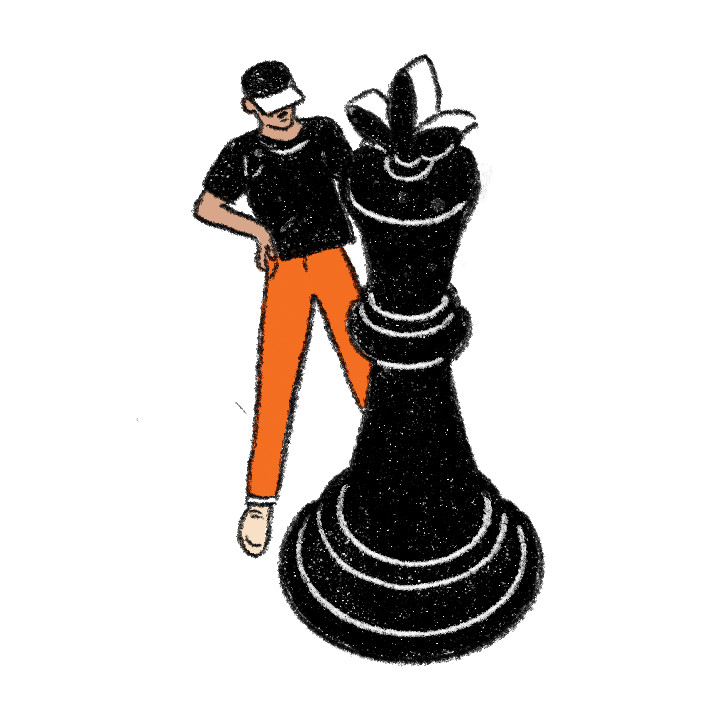
Only I can’t afford to lose the other part of myself, the part that thinks and writes for a living, and I struggled in those first months to fit all my selves in. So, chess. A thinking hobby. A complex dance of creativity, logic, strategy, and decision-making. An overworked metaphor for navigating the myriad challenges life will throw your way.
But a closer connection to the game changes your relationship to the metaphor. What may come as a surprise, when one goes from an uninitiated to a novice chess player, is how much time is spent protecting your pawns. In the colloquial adoption of chess terminology, pawns are understood as disposable—weak and frequently sacrificed. They are manipulated without concern for their existence. Bob Dylan played on this idea in the song “Only a Pawn in Their Game,” his ode to slain civil rights activist Medgar Evers, singing: “On the stone that remains, / carved next to his name, / his epitaph plain: / only a pawn in their game.”
“Pawns, man, in the game, they get capped quick,” the character D’Angelo Barksdale on HBO’s The Wire explains to his reluctant chess students/drug-dealing underlings. “They be out the game early.” Bodie and Wallace, D’Angelo’s students here, are meant to understand themselves as pawns within the hierarchical structure of the Barksdale drug operation, and to accept that their time is short.
“Unless they some smart-ass pawns,” Bodie, the more reluctant and confident of the two, retorts, having also learned that a pawn who makes it all the way to the opponent’s side of the board can be promoted to any other piece, save for a king. And while his quick response suggests that he himself is one of those smart-ass pawns who will one day find himself promoted, it neglects a crucial part of a pawn’s success: No pawn makes it to the other side without protection from the other pieces. Because pawns carry so much potential, the other pieces are called on to exert a lot of energy ensuring their survival; indeed, the queens are more likely to be traded off early if it means retaining a pawn advantage.
For the skilled player, it’s not only the pawns’ potential to reach the other side that makes them worth saving. Pawns defend crucial squares, capture attacking pieces, and in the cleverest instances can deliver a checkmate. “When the pawn hits the conflicts he thinks like a king,” goes the first line of the full title of Fiona Apple’s second album, When the Pawn…, but the pawn doesn’t need to think like a king. Pawns carry their own power.
I shouldn’t overstate the socialist bona fides of chess; it is still a game structured around hierarchies, a literal war game, where the objective is to overpower your opponent. Any other meaning taken away from it is incidental, but also the point. You can unlock something new through considered attention.
The lessons can also come closer to the chest. Through chess I’ve grasped how myopic and inflexible I can be: I become fixated on my plan, and when things go awry, I refuse to look at the other options. I didn’t see my mother’s death coming, refused to consider its possibility, even as the myelodysplastic syndrome turned into leukemia, even as the hospital visits and infections became more frequent, even as the doctor said it would be best to start thinking about transitioning to hospice care. I would not accept the end until it was the end.
I’m the same with chess: I lose more often to checkmate than to resignation. Even when my position is hopeless, I play as if I still have a chance to win. My mother wasn’t wrong when she said I was stubborn. Something else for me to work on.
I’m glad to be able to think again, in the way I’ve grown accustomed to, but now that ability comes with the awareness that attempting to use it to counteract the effects of grief is a losing position. I can’t afford my usual stubbornness here. I have to process. I have to feel. I have to believe this is not in conflict with some other version of myself, but part of a whole being.
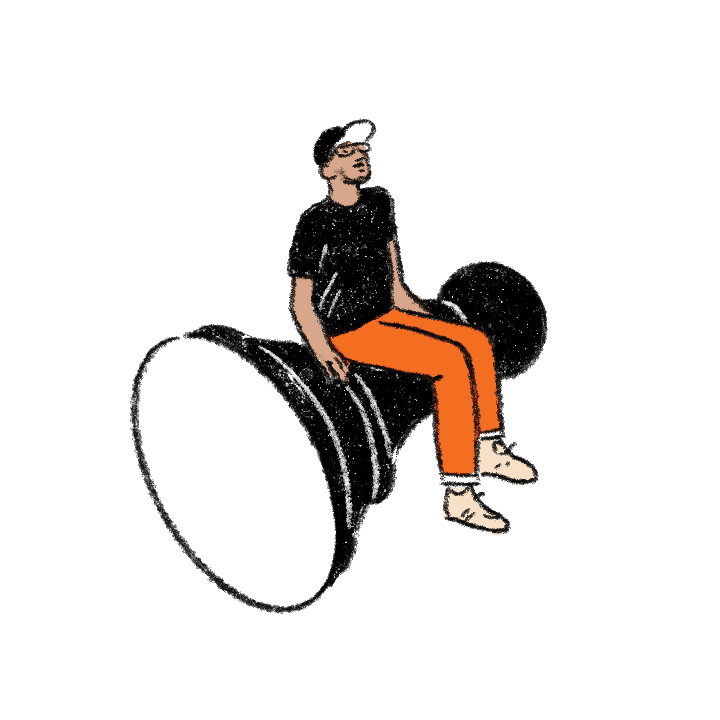
In Chess Story, Czentovic meets his match among the passengers on a ship traveling from New York to Buenos Aires, Argentina. Dr. B comes by his knowledge of the game after being arrested by the Gestapo in Austria; his only respite from Nazi torture is a book of 150 grand master chess games he happens upon. In the hotel room that serves as his cell, he memorizes these games, plays them over and over, in his mind and with his makeshift chessboard, until the isolation and repetition cause him to go mad and attack one of the guards. He diagnoses himself with “chess sickness.”
On the steamship, he’s roped into a match with Czentovic after a group of players, including the narrator, fail in trying to beat the world champion, and are saved in their second game by Dr. B’s interjection (he recognizes a potential blunder from one of the games he has committed to memory). He’s implored to take on Czentovic one-on-one, and reluctantly agrees to a single match only, to protect himself from once again falling into chess sickness. He beats Czentovic and, full of pride, immediately agrees to a rematch, forgetting his own rule. Czentovic senses his weakness, and in the second game takes up all the allotted time he has for each move, riling Dr. B up into a frenzy. Dr. B makes a move with his bishop, exclaims his check on the king, but in his manic state he has not seen the pawn occupying the square, preventing the check.
It had played out differently in his mind.

